- Home
- Karen Traviss
Coalition's End Page 7
Coalition's End Read online
Page 7
“It’s okay.” Baird didn’t want to make it look too urgent and draw attention. “I’ll catch him later.”
“Baird, can I ask you something?”
Here we go. The whole damn base knows.
“Knock yourself out, Lieutenant.”
“You any good at making socket joints?”
That was a relief. “Might be. Okay, yeah. I am.”
“One of the Gorasni guys says he’s got someone who can make prosthetic legs if he can get the metal components.”
Poor bastard. Mathieson was determined to get back to the front line. Baird couldn’t say no. There was a time when he wouldn’t have seen it as his problem and not lost a second’s sleep over it, but not anymore. All he could think of was how Cole—or Bernie—would react if they found out he hadn’t done his bit for Mathieson.
“Yeah,” Baird said. “Can do. I’ll go talk to them.”
“Thanks,” said Mathieson. “I’m going to walk again if it kills me.” Suddenly he stopped and adjusted his headset, frowning as if he’d heard something that bothered him. “Damn, there it goes again.”
“You spend too much time at that desk,” Baird said. “You need to get out more.”
“That’s how I hear things nobody else does. I can spend time wandering around frequencies.” Mathieson gave him a knowing look. “But if you come up with the socket joints, then I’ll be able to get out of here. Won’t I?”
For once, Baird felt like the asshole everyone told him he was. There was a difference between being aware that he said crass things—people expected him to—and that horrible involuntary surge in his chest that warned him he’d feel like utter shit whenever he remembered what he’d just said.
“I’ll make you into a champion sprinter, Mathieson,” he said. “Leave it to me.”
Mathieson smiled and went back to the radio net. Now that Baird had taken up the challenge, he had to do it. And it was going to be a lot easier than cracking that disc. His technical morale needed a boost.
Rivera and Lowe were lounging around outside as Baird left the building. They gave him an up-and-down look as if they were deciding whether to piss on him. He’d never known them all that well, Gears or not, but it was the first time he’d noticed them acting as if he wasn’t on the same team. Maybe they thought they were in the fucking Onyx Guard or something.
Too grand now, are you? Or maybe Prescott’s told you I’ve got his precious disc.
“Isn’t it time you went back to doing a real job?” Baird said, slowing his pace but not stopping. “Who’s going to throw stones at Prescott now the Stranded are gone?”
Okay, there was always the chance that Hoffman would finally lose it and deck Prescott, but most of Jacinto’s refugees thought the sun shone out of the Chairman’s ass. They were still alive against all expectations, and oddly grateful for that.
“He’s the Chairman,” Rivera said. He and Lowe had stopped mixing with the rest of the grunts. “You might want to remember that sometime.”
Baird had to hand it to Prescott. He’d incinerated most of Sera with the Hammer of Dawn, killing millions—maybe even billions—and his grand plan to wipe out the grubs in their tunnels had ended with having to sink Jacinto and run for it. He might have been responsible for more dead humans than the Locust had. But still the idiots followed him.
Would the last chairman have done a better job? Baird would never know. What else could anyone do in a world bombed and burned back to the last century, except find somewhere to hide?
For once, Baird knew he didn’t have a better plan than that. And whatever great ideas and theories he’d come up with over the years, the world had simply stopped making sense to him roughly fifteen years ago, and now it had stopped making sense all over again.
And he was starting to remember exactly what E-Day had felt like.
CHAPTER 4
At 1000 hours this morning, the Union of Independent Republics signed a formal surrender to the Coalition of Ordered Governments and concluded a peace treaty. It is with profound relief that I tell you the Pendulum Wars are now at an end, and that the COG and the UIR will embark on a program of reconciliation and rebuilding to heal the terrible scars—individual and national—that this long, terrible conflict has left upon Sera. We hope that the state of Gorasnaya will come to accept our offer of reconciliation and formally agree to the cease-fire in line with other UIR states.
(Chairman Tomas Dalyell’s official announcement to the citizens of the COG, six weeks before E-Day, fifteen years earlier)
HANOVER, SOUTHERN TYRUS: SIX WEEKS AFTER THE END OF THE PENDULUM WARS.
It was late morning, but the street cleaning vehicles were still pushing a tidal wave of ribbons and paper flags along the gutter.
Hanover had welcomed home more troops last night, and Hanover knew how to party. Cole glanced out the limo’s side window and grinned to himself. That was definitely an item of ladies’ underwear hanging from the lamppost that he’d just passed.
But what else were folks going to do at the end of a eighty-year war, except celebrate like crazy for a few weeks?
Damn, it was hard to believe the Pendulum Wars were over—really, finally, definitely over. Cole didn’t have to have any more fights with his agent about enlisting. The man didn’t understand. Cole felt he had to do his time in the army like every other citizen, and he didn’t want to pull that reserved occupation shit any longer. Thrashball wasn’t like mining or farming or crewing freighters. It wasn’t essential.
Now I ain’t gonna get the chance to serve. Might make Momma happy, but I still didn’t do my duty.
The limo slowed to a stop in the heavy traffic and he went back to reading the contract. In half an hour, he’d be in his agent’s office, upsetting the man all over again and telling him he wasn’t leaving the Cougars. This nice contract from the Sharks wasn’t going to change a thing. It wasn’t about the money.
This is home. Tried leaving once, didn’t like it. Home’s worth any amount of money.
“So did you get to see it, Mr. Cole?” the driver asked. “Are you going to buy it?”
Cole looked up and realized the car was still south of Centennial Bridge. Damn, the traffic was slow today.
“The apartment?” Cole leaned forward and pushed the sliding partition fully open. Josef—Joe—always drove him around town, a real nice guy. It didn’t feel right having this dumb glass barrier between them like Cole was from a different world. “Hell, I thought it was gonna be simple. Nice apartment, easy for my folks to get around town, close enough for me to keep an eye on ’em.” He checked his watch. He still had plenty of time. “Now, Dad likes the ocean view, but Momma don’t like seagulls. Says they shit on the windows. You ever tried to clean seagull shit off glass? She says it’s like needles set in concrete.”
“It’s the fish bones.” Josef checked over his shoulder before pulling out into the next lane. To the traffic around him, Cole was just a big silver limo with tinted windows, an anonymous guy with a lot of money and somewhere important to go. “But your mom doesn’t have to clean her own windows anymore, does she?”
“You don’t know my momma. She don’t want other folks keeping her house clean. Or me paying for anything.”
“That’s moms for you.”
“Ain’t that the truth.”
The whole wealth and stardom thing still made Cole uneasy. It was something he put up with to play thrashball, not his reason for playing. The hardest thing to handle was people treating him like he was better than they were. When he reminded them he was a regular guy, just like them, his agent would sigh and tell him not to spoil it for them because they needed someone to look up to. That was the whole point, he said; they could ask Cole to sign a shirt or something and feel elevated by it. The last thing they wanted to hear was that Cole was ordinary, because that took the shine off everything.
Elevated. What the hell does that mean, that they’re lower than me or somethin’? That just ain’t healthy.
Cole settl
ed for the thrill of winning and the fun of seeing people excited and happy when the Cougars won. Did life need to be any more complicated than that? No, it didn’t. He already had all he wanted and then some. He put the contract back in the envelope.
The limo wasn’t moving. They were now stuck in a sea of gridlocked cars.
“Traffic’s worse than ever,” Josef said. “I bet someone’s broken down on the bridge and blocked a lane. People just don’t know how to merge in this city. Mind if I put the radio on in case there’s a traffic bulletin?”
“Feel free, baby,” Cole said. “No rush. My agent can wait. It’s not like he does it for free.”
Cole was still thinking about how he’d get his parents to accept the penthouse apartment as a gift. He wasn’t really listening to the radio; he was staring out the window, struck by how blue the sky was, and wondering why there were no seabirds wheeling over the water. Maybe they’d all been partying too. He could see the pillars of Centennial Bridge. There were always birds perched along the cables like a string of beads, but not today.
Then, in the way that words you weren’t really listening to suddenly got your attention, he heard someone say evacuate.
“Holy shit!” Josef leaned forward and turned up the volume. “Mr. Cole, did you hear that?”
Cole leaned forward, straining to hear. “I just heard evacuate.”
“Jannermont’s under attack—they’re trying to ship people out.” Josef fiddled with the radio again. “What the hell’s going on?”
Jannermont.
Cole felt suddenly sick. His folks lived there. Who would want to attack Jannermont? “Man, you tellin’ me the Indies have started their shit again?”
“They’re not saying Indies.”
“What are they sayin’, then?”
“They’re saying that … things are coming out of the ground.”
Cole happened to look at the cars either side of him and saw the drivers staring down at their dashboards, not taking much notice of the traffic jam. They were glued to their radios too. He didn’t know which station he was listening to. It was just a breathless reporter talking to even more breathless people. It sounded like the guy was on a street somewhere, grabbing people and asking them what they’d seen. It was hard to hear what he was saying over the noise of artillery fire and yelling.
“So what did you see?”
“They came up out of the ground. They just burst out of holes, right through the pavement.”
“Were they armed? What did they look like?”
“They had guns. They were big and scaly. Gray. I’ve got to go—please, I’ve got to get home.”
Cole sat back in his seat, bewildered. Maybe this wasn’t the news. Maybe this was some dumb-ass stunt or a drama trailer, some stupid shit like that. But he knew it wasn’t. The live report just cut off mid-sentence and he was now listening to an announcer in a quiet studio, but that didn’t make what she said any more real or help him understand it any better.
“I’m sorry, we seem to have lost that link. I’ll try to recap on this morning’s developments—we’re getting reports of attacks on cities across Tyrus, attacks by some kind of alien or animal species that’s emerged from underground. So far we have no idea of casualties, but eyewitness accounts suggest that the loss of life is… substantial. We’re getting reports of similar attacks right across Sera. The Chairman’s due to make a statement soon, but in the meantime police are advising everyone to stay indoors and to keep the roads clear for the army and emergency services.”
Cole’s mind was racing. How close was all this shit to his folks? He had to check they were all right.
“I gotta get to a phone, Joe,” he said, turning to look out of the rear window. The traffic behind was at a standstill as far as he could see. “I gotta check on my folks.”
“Fucking aliens? Animals with guns?” Josef was all high-pitched and disbelieving. “Sorry, Mr. Cole. But what the hell is this?”
Before Cole could answer, Josef looked to his left, seemed to spot something, and hit the gas hard. The car’s wheels spun for a second and then it shot out into a gap in the traffic to tear across three lanes. Horns blared angrily. Josef didn’t stop until he was clear of the bridge approach road. He pulled over by a garage and turned to Cole.
“You wanted to make a call, Mr. Cole.”
“You’re the man, Joe,” Cole said. He jumped out of the car and headed for the phone booth. When he picked up the handset, all he got was a rhythmic peep peep peep with a recorded message telling him the service was unavailable and that he should try again later.
“Goddamn.” He jogged back to the car and bent over to talk to Josef through the side window. “The phone’s out. I’m gonna see what I can find out.”
“Mr. Cole, I better get you home. Things are going to get crazy and dangerous.”
Home was the last place Cole planned to go. “Take the car, Joe. Go find your family. I gotta get hold of my folks. I gotta work out what’s happening.”
He waved Josef on to stop him arguing and broke into a jog. There were stores on the next block. One of them would have a phone that might be working, or at least a TV or something. He didn’t do his own shopping now, but he remembered the store from when he didn’t have people running all his errands and trying to organize his life for him. He found himself jogging past a line of cars waiting to get onto the bridge. There didn’t seem to be many pedestrians walking about, but when he crossed the next intersection he could see why. There was a big crowd at the row of shops up ahead.
Everybody had the same idea. They were drawn to anywhere that had a TV or radio. They were spilling out of the coffee shop and packed tight in front of the electrical store. They didn’t even take any notice of Cole when he ran up to them. Usually, he’d collect his own crowd in seconds, all jostling for an autograph, but today he stood at the back, towering over them and staring at the rows of TVs lined up in the window.
It was like watching a mosaic made from bits of hell.
The news had taken over every channel. The TV folk must have gotten the images from a traffic camera or something because they were just grainy black-and-white pictures, and the time code at the bottom of the screen showed they were an hour old. But they were clear enough for Cole to see things he wouldn’t have believed even in a movie.
The footage showed a highway that looked like the main road into Jannermont, with cars and trucks generally getting on with their business. One moment they were moving along; the next the road ripped up from one end to the other like someone pulling the backbone out of a fish. Vehicles were hurled everywhere. Bodies were thrown from them. For a couple of seconds it looked like an earthquake, weird and unreal, and then things started coming out of a big hole in the pavement.
They weren’t human, but they had two legs and two arms. And most of them were carrying rifles.
Then they used them. They opened up at something out of the range of the camera. Someone ran past the bottom of the frame and fell.
Cole couldn’t so much as breathe for a few seconds. The footage stopped abruptly and the studio anchor appeared, looking as shocked as Cole felt. At the bottom of the screen, captions kept flashing up names of cities—former Indie cities, too, not just COG ones—that had been attacked or that had lost all communications.
The watching crowd was completely silent. Folks were used to seeing bad shit from the war on TV, but nobody had ever seen anything like this.
Eventually someone spoke.
“They’re everywhere.” It was a man standing a couple of rows in front of Cole. “What in the name of God are they?”
“Yeah,” said a woman. “And why now, why that the war just ended? What’s the government doing?”
For once, nobody took any notice of Augustus Cole, the Cole Train, the Cougars’ star player. He was just another shocked, bewildered, scared guy—oh yeah, he was scared all right, because that was the only sane thing to be—and his world had changed forever.
&
nbsp; But whatever the government was planning, Cole— scared or not—knew what he had to do.
He was going to find his folks and get them somewhere safe. He’d move them into his house, whether they liked it or not. Dumb as it was, he wondered if his agent would still be waiting for him, but the man had to know by now that Sera was under attack. That contract could wait.
But Cole had a feeling none of that shit was going to matter ever again.
MATAKI FARM, GALANGI, SOUTH ISLANDS: SIX WEEKS AFTER THE ARMISTICE.
On a bad day, Bernie Mataki was sure she could feel the steel pins that held her leg together.
Each time she put her boot down on the pickup’s clutch, it nagged at her. It wasn’t so much a pain as a vague awareness that the leg was different. The civilian doctor had said that it was something like the phantom sensations amputees felt, itching limbs that just weren’t there anymore, but he told her she still had her leg and she had to settle for being grateful for that. A lot of Gears didn’t have that luxury, he said.
Like I need to be told that, you soft civvie bastard. What do you know about it? Sod all. You spent the war delivering babies and examining piles.
Bernie drove slowly down the track and stopped to take a look at the finisher calves. That had been Neal’s idea in her absence. She preferred rearing beef herself, but he was the one stuck here doing the work while she was away, so she couldn’t complain.
The dog jumped down from the flatbed as she opened the door, expecting some work. She snapped her fingers at him to turn him back.
“Not today, Mossie,” she said. “They’re settling in. We’ll go and move the ewes after lunch, okay? That’ll keep you busy.”
The dog was always pleased to see her, no matter how long she was away. She got the feeling Moss was happier to have her home than Neal was.
My fault. He really thought we could make a go of this once I left the army. I’m the problem. Not him.
The Pendulum Wars were now over and she would have been demobbed at fifty-five anyway. She knew there would always have been a day when she had to leave the army, if she didn’t get herself killed first. It was just the way the shutters came down so suddenly and completely. One day she was elite infantry, a specialist, a platoon sniper, someone with status in a tight-knit clan, and the next moment she wasn’t anybody at all. She was wounded, given a medical discharge, and turned out of the regimental family forever.

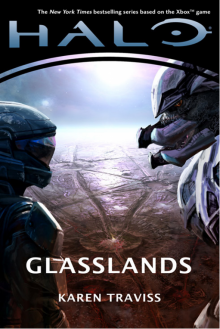 Halo: Glasslands
Halo: Glasslands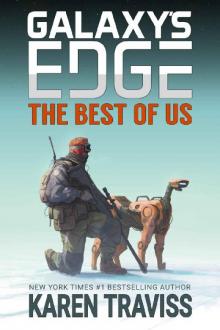 The Best of Us
The Best of Us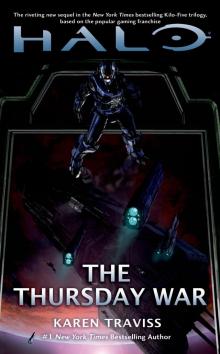 Halo: The Thursday War
Halo: The Thursday War Ally
Ally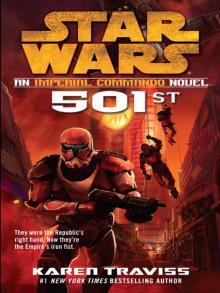 501st: An Imperial Commando Novel
501st: An Imperial Commando Novel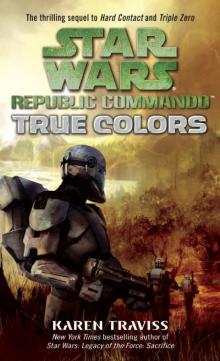 True Colors
True Colors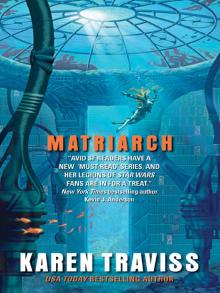 Matriarch
Matriarch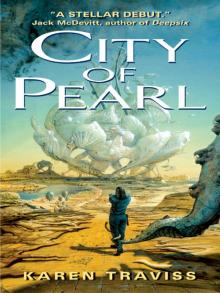 City of Pearl
City of Pearl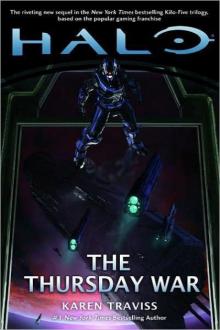 The Thursday War
The Thursday War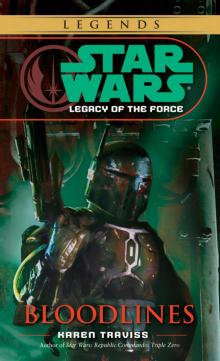 Bloodlines
Bloodlines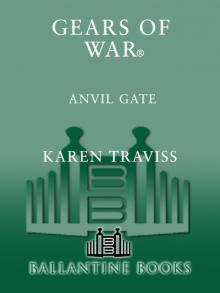 Gears of War: Anvil Gate
Gears of War: Anvil Gate Crossing the Line
Crossing the Line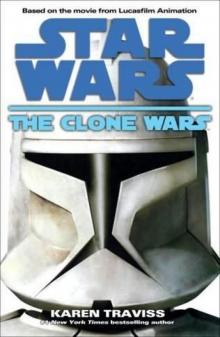 Star Wars - The Clone Wars 01
Star Wars - The Clone Wars 01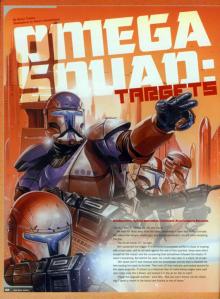 Omega Squad: Targets
Omega Squad: Targets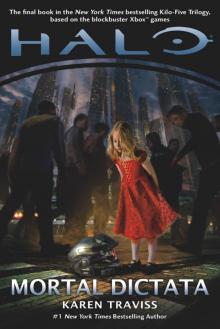 Halo®: Mortal Dictata
Halo®: Mortal Dictata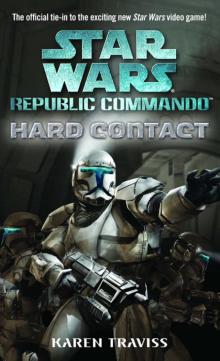 Hard Contact
Hard Contact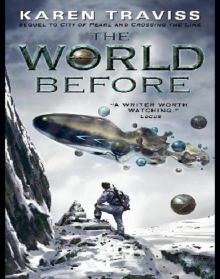 The World Before
The World Before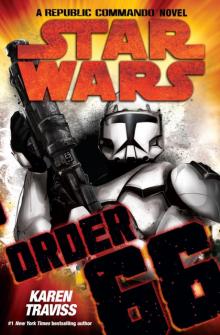 Order 66
Order 66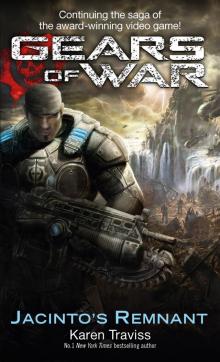 Gears of War: Jacinto's Remnant
Gears of War: Jacinto's Remnant Sacrifice
Sacrifice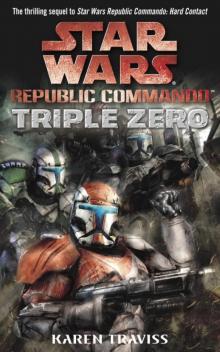 Triple Zero
Triple Zero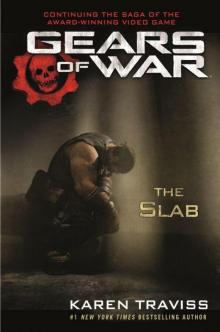 Gears of War: The Slab (Gears of War 5)
Gears of War: The Slab (Gears of War 5)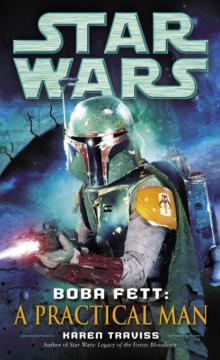 NEW JEDI ORDER: BOBA FETT: A PRACTICAL MAN
NEW JEDI ORDER: BOBA FETT: A PRACTICAL MAN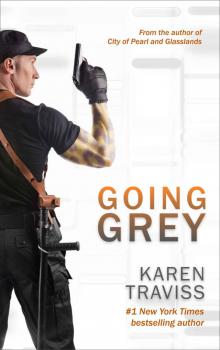 Going Grey
Going Grey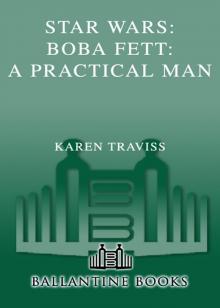 Star Wars: Boba Fett: A Practical Man
Star Wars: Boba Fett: A Practical Man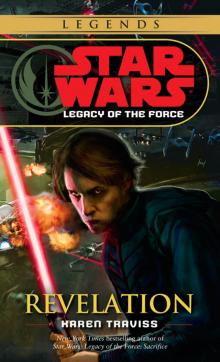 Revelation
Revelation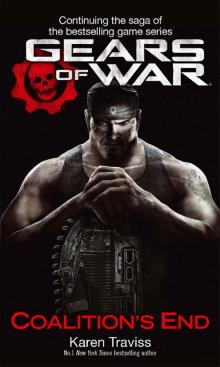 Coalition's End
Coalition's End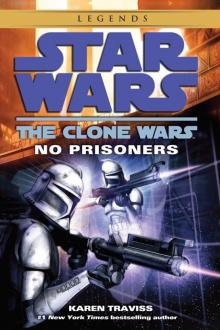 No Prisoners
No Prisoners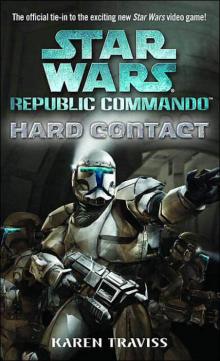 Star Wars Republic Commando: Hard Contact
Star Wars Republic Commando: Hard Contact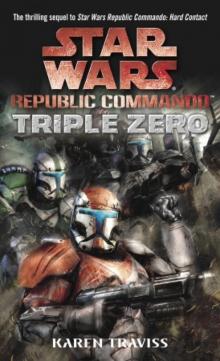 Star Wars: Republic Commando: Triple Zero rc-3
Star Wars: Republic Commando: Triple Zero rc-3 The Clone Wars
The Clone Wars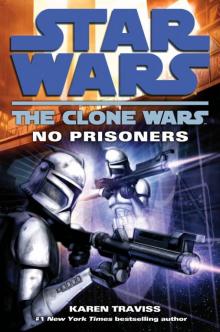 The Clone Wars: No Prisoners
The Clone Wars: No Prisoners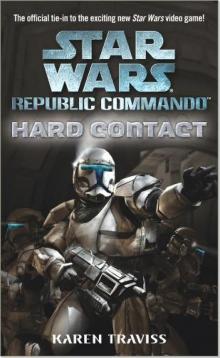 Star Wars: Republic Commando: Hard Contact rc-1
Star Wars: Republic Commando: Hard Contact rc-1 Judge
Judge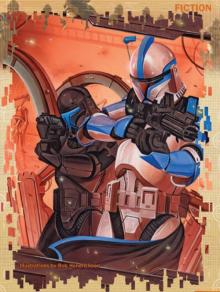 Omega Squad: Targets rc-4
Omega Squad: Targets rc-4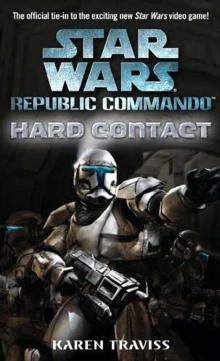 Star Wars - Republic Commando - Hard Contact
Star Wars - Republic Commando - Hard Contact